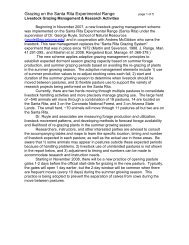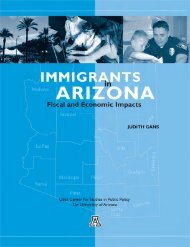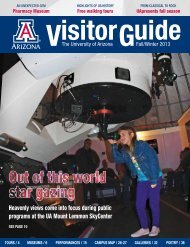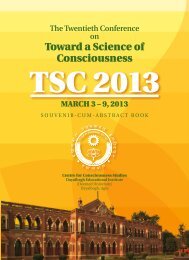CONSCIOUSNESS
Download - Center for Consciousness Studies - University of Arizona
Download - Center for Consciousness Studies - University of Arizona
- No tags were found...
You also want an ePaper? Increase the reach of your titles
YUMPU automatically turns print PDFs into web optimized ePapers that Google loves.
44 1. Philosophy<br />
counter Newman’s argument by claiming that structure is indeed all we need to interpret the<br />
scientific worldview (French/Ladyman 2003). I will defend and extend Newman’s original<br />
argument against various criticisms that have been advanced against it in recent years, and<br />
place it in the context of Putnam’s famous ‘model theoretic argument.’ It will be shown that<br />
modest forms of structural realism will have to assume the existence of some kind of intrinsic<br />
properties. Thus the argument from intrinsic natures to panpsychism will still go through since<br />
prima facie the best candidates for tout court intrinsic properties are phenomenal properties.<br />
Only a radical form of structural realism, a relationalism which assumes only the existence of<br />
relations and denies the existence of objects of any kind, might possibly be defended against<br />
Newmann’s argument. But is this idea ultimately defensible? Going back to Leibniz thesis<br />
that all relational properties must be based in intrinsic properties and by referring to some<br />
recent arguments (Floridi 2008) against the theory of radical structural realism, it will be<br />
claimed that the core argument for panpsychism from intrinsic natures is still standing. It<br />
will then be argued that the best candidate we have for intrinsic properties are (proto-)mental<br />
properties by analyzing some of the alternatives for absolutely intrinsic properties. Physical<br />
properties like “mass” can either be analyzed in functional terms or - after careful analysis -<br />
seem to imply a (proto-)mental aspect. C9<br />
8 Does Panexperientialistic Holism Solve the Combination Problem? Alexander J.<br />
Buck, Ludwig J. Jaskolla (Metaphysics, Munich School of<br />
Philosophy; KSFH Muenchen, München, Germany)<br />
The combination problem is still one of the sternest problems for panexperientialistic<br />
ontology. Prominently, among others, Phil Goff argued in 2009 with two papers that panexperientialists<br />
cannot get around the combination problem. Therefore, they need to argue for the<br />
at first hand contra-intuitive notion of panexperientialism in combination with a strong interattribute<br />
version of emergence bridging the gap between proto-experiential simples and the fullblown<br />
consciousness of human persons. At the end of the day, it seems panexperientialism<br />
rests on weak systematic grounds. We want to address Goff’s challenge from two different<br />
angles: (1) We will argue that Goff’s attack is only relevant, if parsimoniousness is the only<br />
methodological principle for evaluating and comparing ontologies. As soon as other principles,<br />
for example questions of adequacy with everyday experience or coherence with the<br />
framework human theories of reality, are deployed at the problem, we are forced to admit that<br />
panexperientialism is the best option for explaining consciousness in naturalistic terms. (2)<br />
Our second approach will sketch a version of panexperientialism for which the combination<br />
problem does not arise at all. `Panexperiential Holism’, such as supposed by T.L.S. Sprigge<br />
in 2006, is the theory that the universe as a whole is one big experiential matter of fact. What<br />
we normally believe to be independent centers of conscious subjectivity are merely long-lived<br />
structural features of this big experience. We argue that the combination problem does not<br />
arise in this context. The ‘Lego’-Block orientated, naive thought of simple ‘combination’ is<br />
misleading, misguided and must be abandoned. Nevertheless, there are some interesting (and<br />
maybe frightening) consequences entailed by this approach. We will be coping with three of<br />
these consequences: (2.1) The big universal experience needs to be self-referential. (2.2) The<br />
notion of ‘personal identity’ is essentially vague and may lead us into something like Derek<br />
Parfit’s ‘Relation R’ (1984).Therefore, persons are not merely series of experiences, but (in<br />
an anti-realistic fashion) exemplifying the common denominator of these experiences. In this<br />
sense, a person is what has experiences, or the subject of experiences. And (2.3) There is no<br />
lower-limit to reality. Experience is the ontological cement of the World. Despite of these<br />
consequences, quite welcoming some of them (e.g. the resulting personal identity concepts),<br />
we argue that panexperientialistic holism is a promising candidate in the framework of naturalistic<br />
theories of consciousness. C9<br />
9 Abstract and Imaginary Sense Data Scott Jackson <br />
(Prescott College, Tucson, AZ)<br />
Direct realists claim the direct objects of perception are sense data. However, in contrast<br />
to direct realist claims, the senses perceive abstract sense data. The adult and early child-







